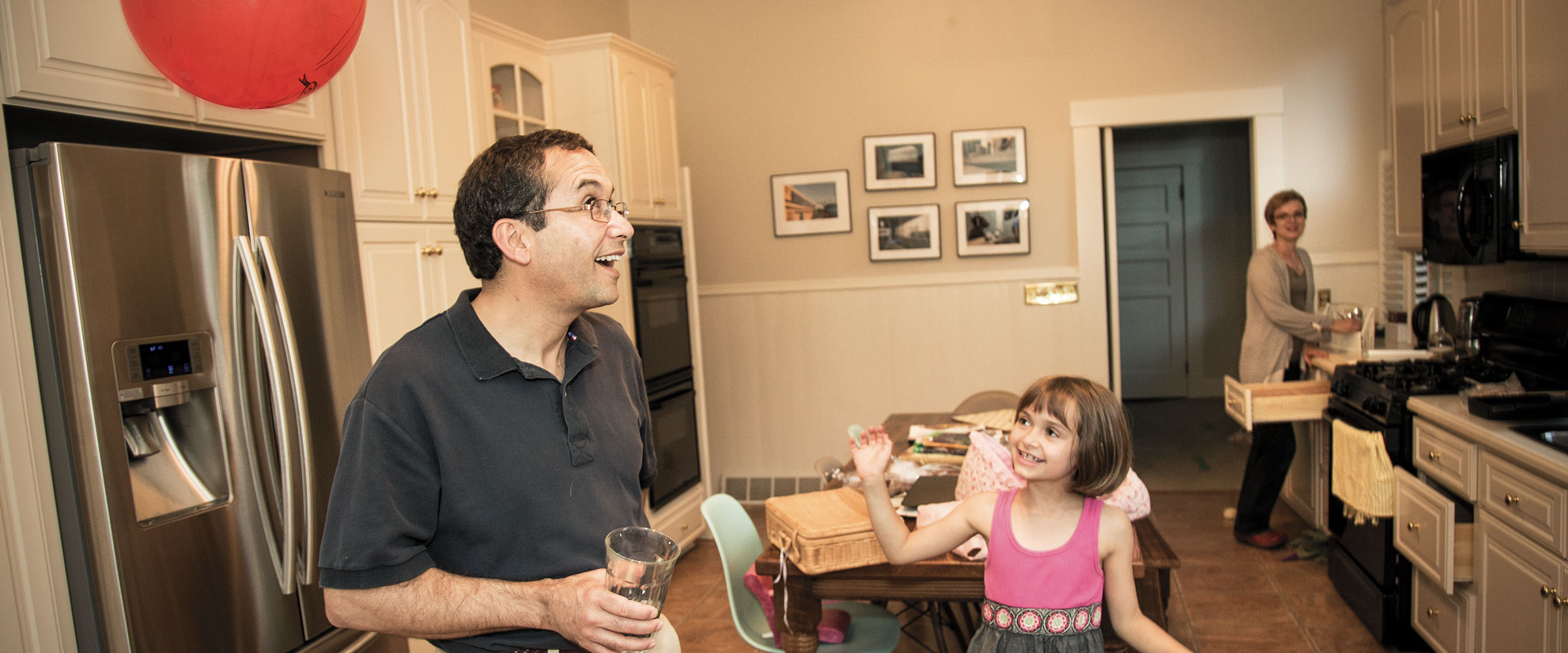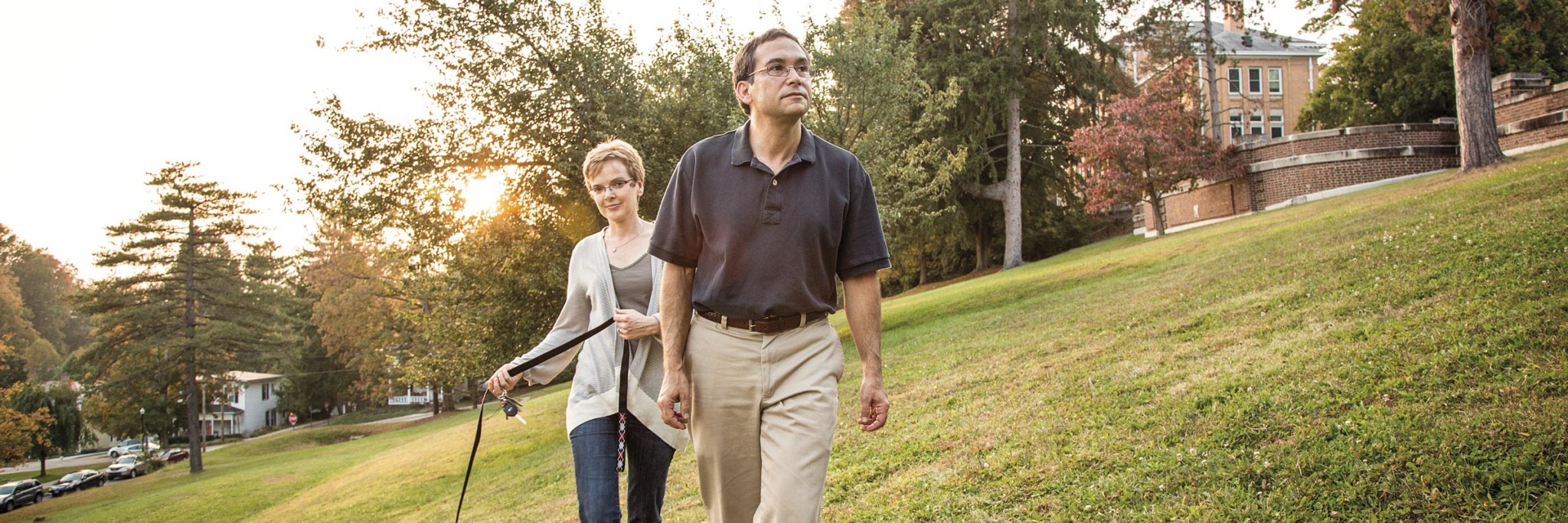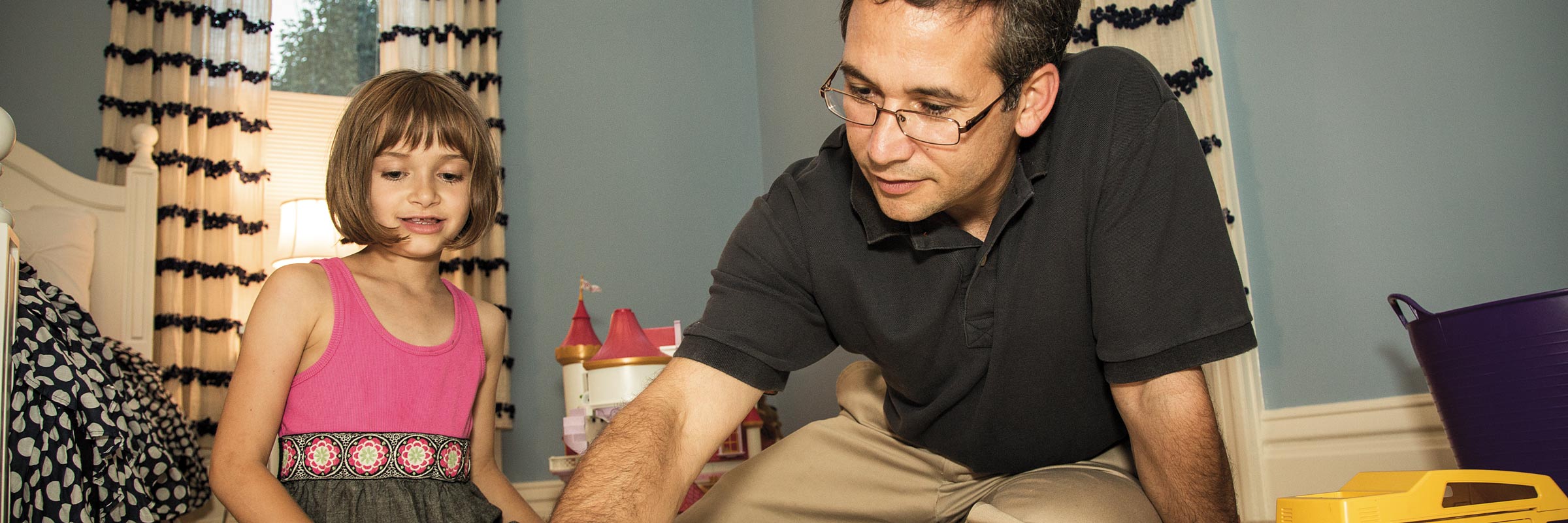When Adam Weinberg answers the door of his Brattleboro, Vt., home in the spring of 2013, he isn’t wearing any shoes, just black socks and his version of business attire: a shirt, suit pants, and no tie—rarely ever a tie—as he stands in his doorway to usher me into his small kitchen, hands in his pockets. Seated in a corner on the floor is daughter Abigail, wearing a fluffy skirt and leggings coupled with a Denison hoodie.
She’s playing blissfully with a dollhouse, while Anne Weinberg moves around the kitchen alternating between stirring the soup and talking about the marketing and communications field that she’ll soon be leaving.
There is no pretension here in this modest home tucked into a quiet neighborhood in the Vermont mountains. No pretension from a guy who has studied at Bowdoin, Cambridge, and Northwestern; who is a member of the Council on Foreign Relations and of the Higher Education Working Group on Global Issues; who is a former vice president and dean at Colgate and at this moment is still the president and CEO of World Learning, one of the nation’s premier international education, exchange, and development organizations.
There is no pretension from the man who is about to become Denison’s 20th president.
In fact, everything about the Weinbergs is quite simple. Their home. The food—homemade soup, salad, and bread—that the Weinbergs serve for supper. Those black socks. Here’s the way Daniel Yalowitz, a family friend and dean of World Learning’s SIT Graduate Institute, would explain it to me later: “What you see is what you get.”
And what you get is a soft-spoken family man who rises every Saturday and Sunday at 5:30 a.m. to get some reading and writing and thought dealt with before the rest of his family members make their way downstairs for breakfast. You get a guy who decided to give yoga and meditation a try when the Weinbergs moved north several years ago—it is Vermont after all—with no intention of ever actually telling anyone about it. You also get a man who describes himself as “radically transparent” and who enjoys a little shake-up now and again. “I have many personality quirks,” says Weinberg, “but I am not conflict-averse. The best ideas arise from clashing views.”
Weinberg, in fact, is a sociologist and a big believer in confronting complex global and social issues—especially the controversial or complicated ones. In Weinberg’s world, you slap those issues right on the dinner table and welcome the conversation and tension that they spur. Some of the best life-learning comes from these moments, he says, and it’s our best bet, as he puts it later, “to reach across difference.”
Halfway through dinner, Abigail does some reaching of her own when she asks me, “Are you Jewish or Christian?”
There is no parental shushing. No flushed cheeks or embarrassed laughter from the heads of the table.
“Uh. Christian.”
“Okay,” she says, “you’re on mom’s side of the family.”
It’s early April, and Anne explains that Abigail has had a lot of questions recently as the family has made its way through Easter and Passover. And with that, dinner rolls on.
Anne, Abigail, Nathan—the Weinberg’s 16-year-old son—and I discuss the family, their lives in Vermont, and what they might expect in Granville. Nathan is looking for an after-school job in the village, and he’s preparing for a trip to Alaska before the big move. Abigail is ready to get into the great big home on Broadway—she’s already chosen her bedroom. We also talk about the Weinberg’s eldest, Margaret, who is off studying at NYU. “She said something interesting to me,” says Adam. “She said that being raised in our household was like having an 18-year liberal arts experience.”
Soon after dinner ends, and the kids have excused themselves to do something other than talk about their new life in Ohio, Abigail emerges with a broken toy that needs Dad’s touch. Weinberg moves from a conversation about big ideas in academe to his daughter without flinching. In this moment, he is solely Abigail’s dad working on Abigail’s toy. With it fixed, he promptly picks up where he left off without a single “um” or “Where was I?”—a phrase that nearly every other parent I know employs at least 5,476 times in any given 24-hour period.
There is no doubt that this guy is focused.

Adam Weinberg speaks in outlines. He has points, and subpoints, and he numbers them and bullets them in every speech he’s given since his arrival at Denison on July 1—the “listening sessions” he’s conducted with every department from psychology to physical plant to student development; his first address to the faculty; his induction speech welcoming the Class of 2017; even at a casual dinner held in the Henderson Gardens at Monomoy for the Paving the Way student leaders. (Thanking them for participating in the program was bullet No. 1.)
In any group setting, he alternates between answering questions and asking his own. “Where do you think Denison’s strengths lie? I get the impression that people like Monomoy to be open. Is that the impression you get?” And he consistently encourages any college employee to email him with ideas or thoughts or to set up a time to speak with him. The problem is, according to his former employees at World Learning, he means it.
“He will try to meet with anyone who wants a meeting,” they told me in one form or another during an afternoon spent on the campus of World Learning, a statement that, frankly, seems like just the thing one would say when a writer comes ’round asking about the boss’s flaws. Except that nearly everyone said the same thing. Everyone. True to form, when Weinberg was hired and came to Denison for a three-day whirlwind of meetings in the spring, he received an email from a student wanting to know where the new president stood on fraternity and sorority life. Weinberg met with the student over breakfast the next day—before his scheduled meetings began.
He has had months to develop his thoughts on campus issues, including that one (he considers fraternities and sororities to be important aspects of campus culture, by the way, even if fraternities no longer occupy physical residential space on campus). He was named Denison’s 20th president in January but had six months to wait before he would actually take the helm upon Dale Knobel’s retirement on June 30. Though Weinberg admits he was anxious to get going, he also acknowledges that it’s a gift not often afforded college administrators—six months to study and think and talk with constituents and college employees. He also developed some pretty strong opinions when it comes to Denison in that time. Some of the statements he makes are fairly typical of a college president. He believes, not surprisingly, that Denison has long been overlooked as one of the elite liberal arts institutions, right up there with Williams, Swarthmore, and Middlebury. “It’s time we took our rightful place,” he says in meeting after meeting. And he is willing to tell anyone who will listen how great the college is—it is his job, after all, to sell the place to prospective students and faculty, as well as parents and donors. But Weinberg is also willing to make some frank statements about his new employer when it comes to Denison selling itself. “Denison has a Midwest humility that I can appreciate,” says Weinberg, “but it sometimes seeps into an institutional insecurity that is factually incorrect and not helpful.”

"We should be getting students to recognize problems and them develop the skills to solve them on their own."
When the Denison board announced the college’s 20th president, Weinberg set out on a “presidential tour,” during which he chatted with college presidents at liberal arts schools such as Swarthmore, Colorado College, Carleton, Smith, Trinity, and Oberlin to gain knowledge about the role and the best way to approach it. But it’s not as if Weinberg is completely new to leading an academic organization.
For eight years, he worked at World Learning in Brattleboro, first as executive vice president and provost of the organization’s accredited higher education division, SIT (formerly the School for International Training). While there, he worked to expand World Learning programs, including The Experiment in International Living, SIT Study Abroad, and the SIT Graduate Institute. One can see how those experiences have woven their way into Weinberg’s hopes and dreams for Denison. It has a lot to do with civic education and his belief that this college generation and the ones that follow will face some of the toughest global and social issues the world has ever faced—climate change, human trafficking, failing governmental systems.
There is no doubt, says Weinberg, that the human race, as it stands right now, has the technology and knowledge to solve these problems. What we lack, he asserts, is the capacity to come together as human beings and actually solve them. We are a polarized people, he says, in a world that continues to polarize us based on our political leanings, our strengths, our interests, our backgrounds, our race, our religion. If we don’t push students to confront these differences now, and work through them, we’re in for big trouble. And to Weinberg, this teaching takes place in classroom discussion, but it can start even earlier than that—on move-in day.
Just over a decade ago, college administrators began to steer away from what Weinberg dubs a “hotel education,” in which parents checked students in and staff kept them happy. (Don’t like your roommate? Here, try this one.) “I think that faculty, administrators, and staff on campus need to see themselves as coaches and mentors, not as problem-solvers, because we shouldn’t be trying to solve problems for students,” says Weinberg. “We should be getting students to recognize the problems and then help them develop the skills to solve them on their own.”
A lot of what Weinberg believes goes back to his grandfather and to his childhood summers spent in Arkansas. “My grandfather built community as part of his daily life without ever thinking about it,” says Weinberg. “When the local banks would not lend to African-Americans, he worked with others to run a bank. He was not a banker. He sold clothes. But when he saw a problem, he got people together, and they worked to resolve it.”
Weinberg believes that college campuses—especially liberal arts college campuses—should be looked upon as “design labs” in civic education, labs that allow students to tackle issues from the roommate dispute to societal inequalities. Labs that give students the freedom and the space to explore issues in depth and to devise strategies to face them, and hopefully, to eradicate them. “The question for leaders of this generation is ‘How do we get large institutions that are mostly set up to be slow and conservative to adapt to a world that is going to require them to be nimble and entrepreneurial?’” The future will be shaped by people who can thrive in diverse environments, who embrace constant change, and who can creatively solve problems, says Weinberg, and he genuinely believes a campus like Denison is the perfect place to foster that kind of thinking.
Sometimes that process can be uncomfortable as students delve deeply into tough issues and hear points of view that contradict their own. But Weinberg wants students to get comfortable with being uneasy. “Seek out professors and peers who have views that threaten you to your very core, and learn to hear them. Don’t be afraid to fail,” Weinberg told the Class of 2017 during its induction ceremony. “Sociologist Erving Goffman reminded us that a basic human drive is fear of embarrassment. Learn to live with it. Take risks. Accept failure and embarrassment as part of the path toward a life worth living.”
At World Learning, Weinberg says, he often got calls from parents before their students headed off to programs in foreign countries. “The question was always the same,” says Weinberg. “‘Can you promise me that my child is not going to get a stomach virus?’ And the response was always the same: ‘I can guarantee you that she will, but our staff members are great, and they are going to help her learn to cope with the discomfort, the embarrassment, the inconvenience, and your kid is going to become smarter and more confident—which is what we all want.’”

Adam Weinberg is watching a women’s volleyball game and checking his phone every few minutes to see where Anne and Abigail might be. When he spots them in the doorway of the gym, the phone slips away. For Weinberg, there is no division of home life and work life, which isn’t surprising coming from a family that has always valued the life of the mind, from the moment Adam and Anne met in a book club.
Early on, the couple forged an egalitarian approach to home responsibilities and work demands. Adam pulled a stint as a stay-at-home dad to Margaret while pursuing his master’s degree, and Anne, an oboist and communications specialist, took the opportunity to pursue a career that would eventually take her to Democracy Matters, Inc., a nonpartisan national student organization, where she was director of communications and operations. Before moving to Granville, she was the director of marketing for the Oak Meadow Curriculum and School in Brattleboro.
Adam reflects on that work-life balance. “I decided that my life would be work and family,” he says, “and that’s it.” Truth be told, there’s not room for much more. Weinberg likes his schedule packed with meetings running back-to-back when possible. Adam and Anne share calendars on their phones, so every time Adam has a meeting, Anne’s phone beeps.
Anne’s phone beeps a lot.
Right now texts are coming in to her from Nathan, who is home studying vocabulary for classes at Granville High School. Anne turns to Adam and tells him he’ll have to quiz Nathan when they get home. Adam nods.
Then he perks up. “Hey, ask him if he wants to come up and get a burger and fries at Slayter.”
Weinberg spends most evenings on campus. He’s managed to hit almost every home game in every sport this season. On the off-nights, he’s walking with Abigail and their nearly year-old puppy Ellie through East Quad, asking students how classes are going. He and Abigail often end up in Slayter, where the ice cream choice is more diverse than in the dining halls.
When they’re not up on the Hill, the family is welcoming faculty and students to their home for evening coffee and chat sessions to discuss campus and world issues and student and faculty research. The 10,000 square feet that Monomoy affords lets Nathan and Abigail hide out upstairs when they want, or hit the sack when evenings run long. It also means that the family has space for a guest room for visitors—whether family or college trustees. “I think it’s going to take a while for folks to realize we mean it when we ask them to stay with us,” says Anne.
Though the Weinbergs seem to thrive on “chaos,” as Adam puts it, they have had to make a few adjustments to a life in Monomoy. When the museum sent over a prize vase to be put on a pedestal display at the house, Anne had to send it back after a few days when she realized that the lively antics of a 7-year-old, her friend, and a puppy weren’t the best conditions for such a relic.
Even so, the place is feeling like home these days. The kitchen table is stacked with homework and the occasional pizza box from Elms. Nathan walks downtown most evenings to work at Whit’s, and Abigail can be spotted in the yard tossing a ball out toward the Fine Arts Quad for Ellie to chase.
In the evenings, the lights inside Monomoy seem always to be on, and the gate that surrounds the property seems always to be propped open.

